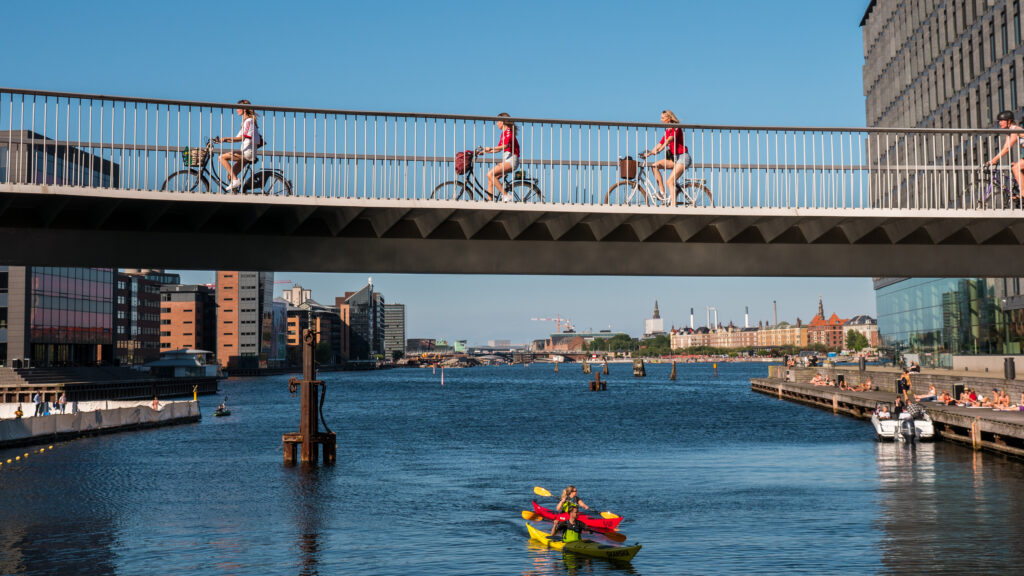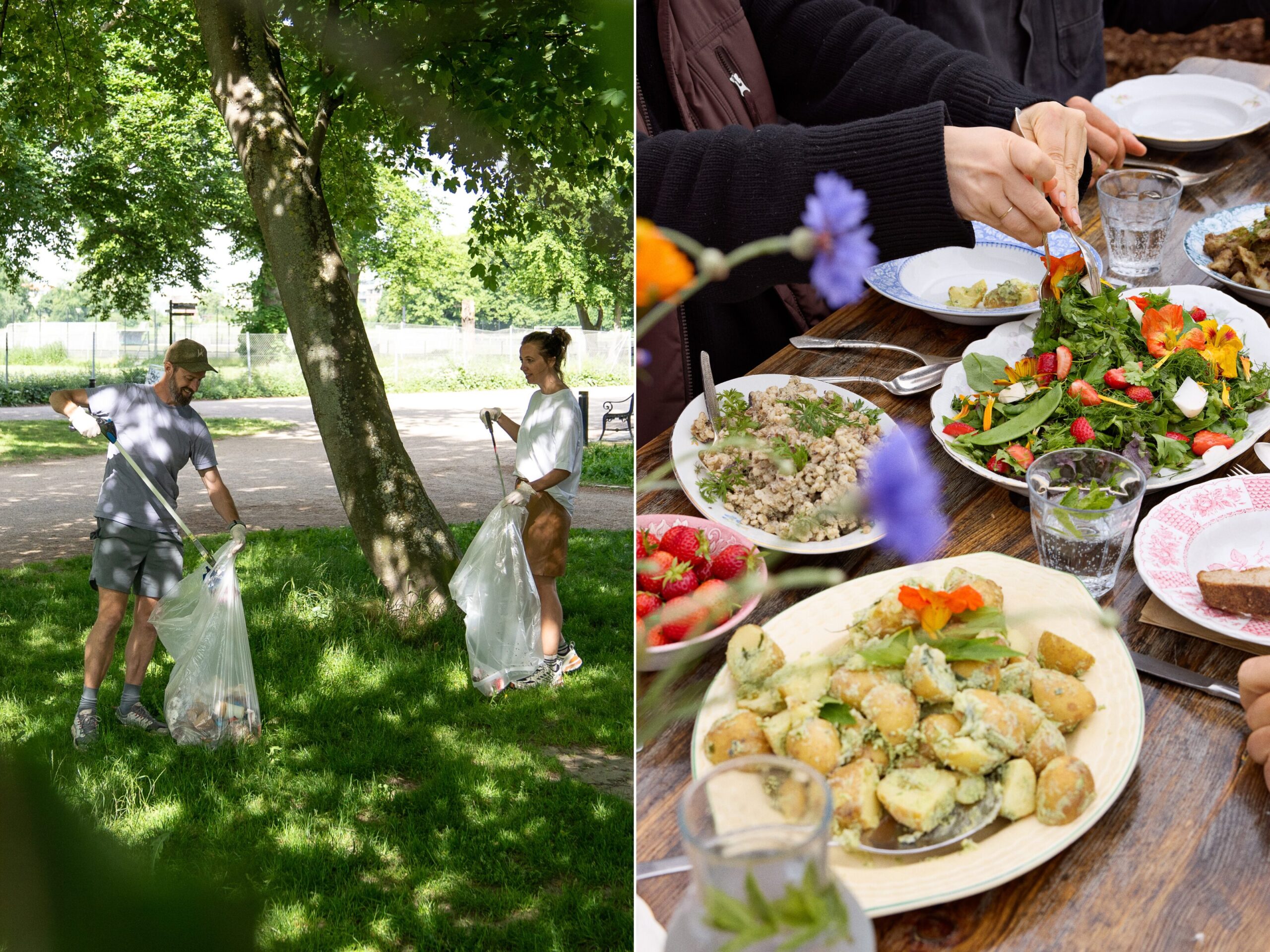CopenPay: Danish Capital Trials Scheme to Reward Tourists for Climate-Friendly Actions
5 Mins Read
Copenhagen’s tourist board is rewarding visitor and residents with free meals, cruises and kayaks if they help clean and green up the city.
Selfies are a no-go in parts of Portofino, Italy. Loudspeakers are no longer allowed in Venice. A cruise ban is on the cards in Amsterdam. And in Iceland, there are plans to introduce a tourist tax. Overtourism has become irksome in Europe, symbolised by the protestors spraying water on tourists in Barcelona.
Excessive tourism doesn’t just put a strain on a city’s resources, economy and health services – it’s also detrimental to the planet. Tourism is responsible for 8% of global emissions. Travelling responsibly is more important than ever.
But it’s hard to incentivise people to be eco-friendly and mindful when they just want to be on holiday. There is one thing that every tourist loves, though: free stuff. And that’s exactly what Copenhagen is leveraging in its bid to make tourism more sustainable.
The Danish capital is running a monthlong trial starting this week, which rewards visitors (and even residents) with free meals, coffee, beer, tours and activities if they participate in climate-friendly tasks.
Called CopenPay, the scheme went live on Tuesday (July 15), and will run until August 11, coinciding with the Danish capital’s high season. The idea is to encourage sustainable behaviour while enriching cultural experiences by “transforming green actions into currency”, the city’s tourism board explains.
“It is a core task for us to make travelling sustainable,” said Mikkel Aarø-Hansen, CEO at Wonderful Copenhagen. “And we will only succeed if we bridge the large gap between the visitors’ desire to act sustainably and their actual behaviour.
“It might sound simple, but it is not. We want visitors to make conscious, green choices and hopefully end up getting even better experiences while they visit.”
How CopenPay works

Copenhagen’s move comes as more and more travellers become conscious of their actions. But a value-action gap remains – a 2023 Kantar survey found that while 82% of tourists want to act sustainably, only 22% have actually realigned their behaviours.
To bridge that gap, 24 organisations and businesses have signed up to the CopenPay initiative, including The National Gallery of Denmark, The National Museum, bike rental company Donkey Republic, Sparta (the city’s largest park), rooftop bar Level Six, and the Copenhagen Surf School.
“When you travel abroad – if you fly to other places or you travel by car – you pollute,” Wonderful Copenhagen’s communications chief Rikke Holm Petersen told the BBC. “One of the things we can change is getting people to act more sustainably at the destination.”
So what can these acts entail? And what’s in it for you? The rewards are divided into three broad categories – food and drink, urban exploration, and cultural experiences.
Urban garden Øens Have offers free lunches for volunteers on the farm, as does eco culinary hub BaneGaarden if you collect trash there. Social eating community Absalon provides discounts for breakfast if you travel by foot, bike or public transport. These forms of transportation will also get you free beer at rooftop bar Zoku and rosé on the promenade at the old port of Langelinieskuret.
Arriving by bike or public transport entitles you to plenty of rewards at museums: free ice cream at The National Museum, free coffee at the open-air museum Frilandsmuseet and at the Museum of Copenhagen, and discounted tickets at communications museum Enigma. Meanwhile, if you bring plastic waste to the National Gallery, you can turn it into a piece of art at a workshop.
In terms of experiences, you can rent a kayak for free if you collect waste from the water. Travelling by public transport, bike or foot has plenty of benefits here too – you can take a free canal tour on an electric boat, a one-hour boat cruise (where you will pick up waste), and get 20 minutes of extra time skiing time. Sparta, meanwhile, offers free coffees for logging, a blend of jogging and picking up litter.
Most of these rewards are trust-based. Attractions are usually unlikely to ask you for proof that you completed the climate-friendly activity. “In some attractions, you might have to show a picture of you riding a bike, or of your public transportation ticket,” explained Petersen.
Eco tourism scheme could go national if successful

The tourism board explicitly states that CopenPay is “not intended to increase tourism”. Overnight stays numbered 12 million in the city last year, but Petersen only expects a small share of visitors to participate in the scheme.
If it is successful, CopenPay be rolled out as a year-round initiative, and even expanded to other parts of Denmark. “Imagine if we could have people taking a greener mindset back with them – if that was the souvenir they got – that would be amazing,” Petersen said.
“We must turn tourism from being an environmental burden into a force for positive change, and one important step in this transformation is to change how we move around on the destination, what we consume, and how we interact with the locals,” said Aarø-Hansen.
“Since travelling is international, our success is dependent on the choices of people and destinations elsewhere. We therefore also strive to inspire sustainable behaviours and cultural appreciation worldwide,” he added.
The CopenPay scheme is the latest marker of the Danish capital’s status as a green city. Copenhagen is ranked as the third-most sustainable city globally (behind fellow Nordic cities Gothenburg and Oslo). It has four times more bikes than cars, more than 70% of its electricity is sourced from renewables, and its heating is primarily powered by biomass.
On a national level, Denmark has been rolling out climate policies to meet its target of cutting emissions by 70% from 1990 levels by the end of the decade. It was the first nation to roll out a national plan to promote a shift to a plant-based food system, focusing on R&D investment, ramping up vegan meals in the education sector, training chefs and kitchens, and upping exports of plant-based food.
And last month, it introduced the world’s first carbon tax on agriculture, its largest source of emissions (between 22-28%), with livestock making up a majority of this. The levy would cost farmers around $100 for emissions from each of their cows.



